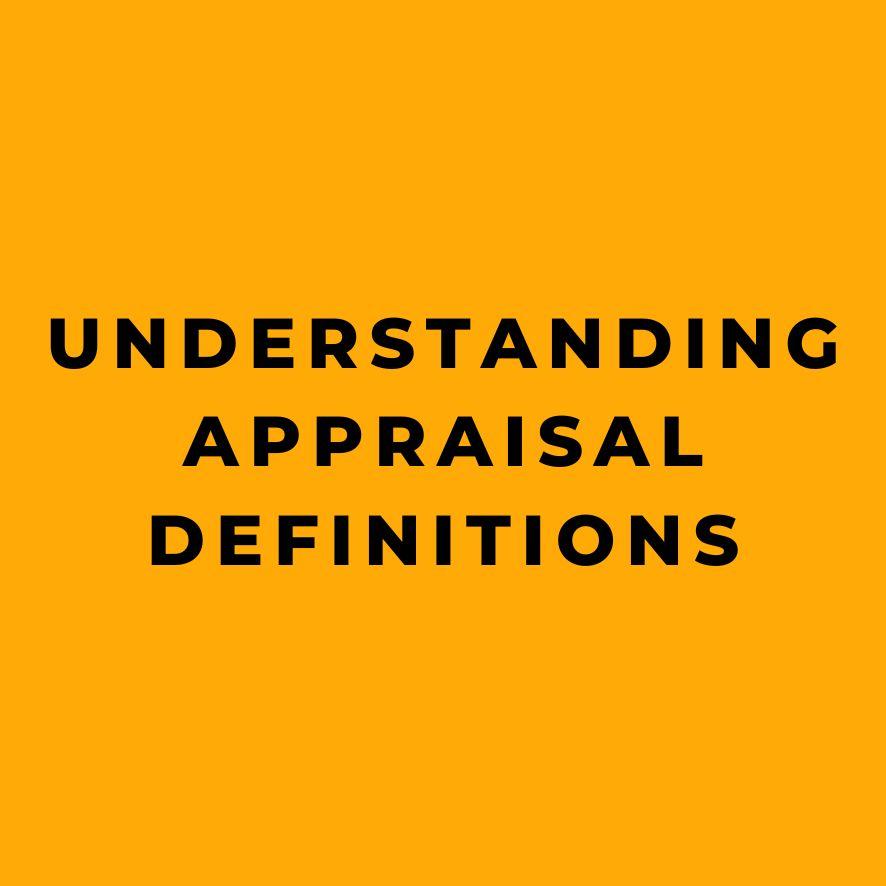The process of appraisal is a critical component of various industries, including real estate, finance, and taxation. Appraisal involves determining the value of a property, business, collectible, or antique by the estimate of an authorized person. This valuation is essential for various purposes, such as insurance, taxation, and determining selling prices. Understanding the definitions and concepts related to appraisal is crucial for anyone involved in these industries, whether as a professional appraiser, a property owner, or a potential buyer.
In this comprehensive article, we will delve into the various aspects of appraisal definitions, providing a thorough understanding of the key concepts, terms, and methodologies involved. From the basics of what an appraisal is to the different types of appraisals and their significance, this article aims to equip readers with a comprehensive understanding of the appraisal process.
Defining Appraisal
An appraisal is the act or process of developing an opinion of value, and it represents an estimate of the fair market value of a property, business, antique, or collectible. The individual conducting the appraisal, also known as the appraiser, must be authorized and have a designation from a regulatory body governing their jurisdiction. This designation ensures that the appraiser is competent, independent, impartial, and objective in their valuation process. Appraisals are typically used for insurance, taxation, and determining selling prices for various assets.
Common Appraisal Terms
To gain a deeper understanding of appraisal definitions, it’s important to be familiar with common appraisal terms. These terms include:
1. Appraiser: An individual authorized to perform valuation services competently and in an independent, impartial, and objective manner.
2. Appraisal Report: Any communication, written or oral, of an appraisal that is transmitted to the client upon completion of an assignment.
3. Appraised Value: A professional assessment of the condition and worth of a piece of property at a specific point in time.
4. Market Value: The estimated amount for which a property should exchange on the date of valuation between a willing buyer and a willing seller in an arm’s-length transaction after proper marketing wherein the parties had each acted knowledgeably, prudently, and without compulsion.
These terms form the foundation of the appraisal process and are essential for anyone involved in real estate transactions, finance, or taxation.
Types of Appraisals
There are various types of appraisals, each serving different purposes and utilizing different methodologies to determine the value of an asset. Some of the common types of appraisals include:
1. Real Estate Appraisal: This type of appraisal is used to determine the value of real property, such as land, residential, or commercial properties. Real estate appraisals are crucial in real estate transactions, mortgage lending, and property insurance.
2. Business Appraisal: Business appraisals are conducted to determine the value of a business entity. This type of appraisal is essential for business owners, investors, and stakeholders, especially during mergers and acquisitions, business sales, or dispute resolutions.
3. Personal Property Appraisal: Personal property appraisals are conducted to determine the value of collectibles, antiques, art, jewelry, and other personal assets. These appraisals are often used for insurance, estate planning, and asset management purposes.
Understanding the different types of appraisals allows individuals to appreciate the specific methodologies and considerations involved in valuing different types of assets.
Appraisal Process
The appraisal process involves a series of steps that an appraiser follows to determine the value of an asset accurately. These steps typically include:
1. Property Inspection: The appraiser conducts a physical inspection of the property to assess its condition, size, features, and any improvements or renovations.
2. Market Analysis: The appraiser analyzes recent sales data of comparable properties in the area to determine the property’s market value.
3. Application of Valuation Methods: Depending on the type of asset being appraised, the appraiser applies relevant valuation methods, such as the sales comparison approach, cost approach, or income approach, to determine the value of the asset.
4. Preparation of Appraisal Report: The appraiser compiles all the findings and valuation results into a comprehensive appraisal report, which is then communicated to the client upon completion of the assignment.
By understanding the appraisal process, individuals can gain insight into the meticulous and thorough approach appraisers take to determine the value of an asset accurately.
Appraisal Vs. Assessment
It’s essential to distinguish between appraisal and assessment, as these terms are often used interchangeably but serve different purposes. An appraisal involves determining the value of a specific asset, such as a property, business, or collectible, by an authorized appraiser. On the other hand, an assessment refers to the process of assigning a value to property for taxation purposes. Assessments are typically conducted by local governments or tax authorities to determine property taxes.
Understanding the distinction between appraisal and assessment allows individuals to appreciate the different contexts in which these valuation processes are utilized.
Practical Applications of Appraisals
Appraisals have practical applications in various industries and scenarios. Some of the common practical applications of appraisals include:
1. Real Estate Transactions: Appraisals are crucial in real estate transactions, as they help determine the fair market value of a property, ensuring that buyers and sellers are making informed decisions.
2. Mortgage Lending: Lenders require appraisals to assess the value of the property being used as collateral for a mortgage loan, ensuring that the loan amount aligns with the property’s value.
3. Insurance Purposes: Appraisals are used to determine the replacement cost or actual cash value of insured properties, ensuring that policyholders have adequate coverage.
4. Estate Planning: Personal property appraisals are essential for estate planning, as they help individuals determine the value of their assets for inheritance and tax planning purposes.
By understanding the practical applications of appraisals, individuals can recognize the significance of valuation processes in various aspects of their personal and professional lives.
Challenges and Considerations
It’s important to acknowledge the challenges and considerations associated with appraisals. Factors such as market volatility, property condition, and the availability of comparable sales data can impact the accuracy of appraisals. Additionally, appraisers must adhere to ethical and professional standards, ensuring that their valuations are unbiased and objective. Understanding these challenges and considerations allows individuals to approach appraisals with a well-informed perspective, appreciating the complexities involved in determining the value of an asset.
Conclusion
In conclusion, understanding appraisal definitions is essential for anyone involved in real estate, finance, taxation, or asset management. By grasping the key concepts, terms, and methodologies related to appraisals, individuals can make informed decisions, navigate transactions, and ensure that their assets are accurately valued. From the basics of what an appraisal entails to the practical applications and considerations associated with valuation processes, a comprehensive understanding of appraisal definitions equips individuals with the knowledge to engage effectively in various aspects of the appraisal process.










